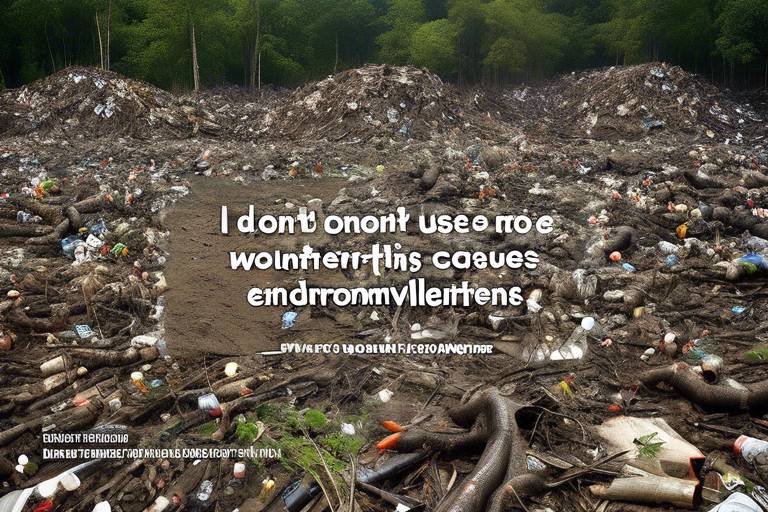10 Tips for Eco-Friendly Camping
Are you ready to embark on an eco-friendly camping adventure that not only allows you to connect with nature but also minimizes your environmental footprint? Here are 10 essential tips to help you make your camping trip sustainable and environmentally friendly.
First and foremost, when planning your camping trip, choose a green campsite that is designated for camping. By selecting established campsites, you can help preserve natural habitats and minimize the disturbance to wildlife that may occur with unauthorized camping.
Invest in reusable camping gear that is durable and eco-friendly. Opting for sustainable gear not only reduces waste but also promotes a culture of sustainability within the camping community.
Practice Leave No Trace principles during your camping trip. This means following guidelines to leave the campsite as you found it, ensuring that you respect nature and wildlife by minimizing your impact on the environment.
When it comes to campfires, aim to minimize their impact on the environment. Use existing fire rings, keep fires small, and opt for local firewood to reduce the environmental consequences of your campfire.
Make a conscious effort to reduce single-use plastics during your camping trip. Bring reusable water bottles, utensils, and containers to minimize plastic waste and protect the environment from unnecessary pollution.
Properly dispose of waste while camping by packing out all trash, including food scraps. Utilize designated waste disposal facilities to ensure that your camping area remains clean and free from litter.
Respect the wildlife that calls the camping area home. Observe animals from a distance, avoid feeding them, and store your food securely to prevent wildlife encounters that could be harmful to both humans and animals.
Conserve water during your camping trip by using it sparingly and collecting rainwater for washing purposes. Avoid contaminating natural water sources to maintain the integrity of the environment.
Support sustainable brands in your camping gear choices. Opt for eco-friendly camping brands that prioritize sustainability and environmental stewardship, ensuring that your camping equipment aligns with your commitment to the environment.
By incorporating these 10 tips into your eco-friendly camping practices, you can enjoy the great outdoors while minimizing your environmental impact and contributing to the preservation of nature for future generations.

Choose a Green Campsite
When it comes to eco-friendly camping, one of the crucial decisions you can make is choosing a green campsite. By selecting designated campsites, you contribute to the preservation of natural habitats and help in reducing disturbance to wildlife. These campsites are specifically designed to accommodate campers while minimizing the impact on the surrounding environment.
Green campsites often have established facilities such as composting toilets, recycling stations, and proper waste disposal systems to ensure that campers can enjoy their outdoor experience without leaving a negative mark on the environment. These campsites are strategically located to offer breathtaking views and access to nature while promoting responsible camping practices.
When you opt for a green campsite, you are not only supporting sustainable tourism but also actively participating in conservation efforts. By respecting the designated camping areas, you are contributing to the overall well-being of the ecosystem and helping to maintain the natural balance of the environment.
Choosing a green campsite is not just about finding a place to pitch your tent; it's about making a conscious decision to align your camping experience with environmental stewardship. By camping responsibly and selecting eco-friendly campsites, you are taking a step towards a more sustainable future for outdoor recreation.

Use Reusable Camping Gear
Explore sustainable practices to minimize environmental impact while enjoying the great outdoors.
When it comes to eco-friendly camping, choosing reusable gear is a game-changer. Imagine the impact of swapping out single-use items for durable, eco-friendly alternatives. Not only does this reduce waste, but it also promotes sustainability in the long run.
Picture this - a sturdy, reusable water bottle that you can refill at natural water sources along your hiking trail. No need for disposable plastic bottles that harm the environment. Investing in quality camping gear that can be used multiple times not only benefits the planet but also enhances your camping experience.
Additionally, consider using multi-purpose items like a camping utensil set that eliminates the need for disposable cutlery. This simple switch can significantly reduce plastic waste during your outdoor adventures. By embracing reusable camping gear, you not only lighten your ecological footprint but also set a positive example for others to follow.

Practice Leave No Trace Principles
When it comes to eco-friendly camping, one of the most crucial principles to follow is practicing Leave No Trace. This principle emphasizes the importance of leaving the campsite in the same condition as you found it, ensuring minimal impact on the environment. By adhering to Leave No Trace guidelines, campers can play a significant role in preserving the natural beauty of camping areas for future generations.
One key aspect of practicing Leave No Trace is to properly dispose of all waste generated during your camping trip. This includes not only picking up trash but also ensuring that food scraps and other biodegradable items are packed out. By leaving no trace of your presence, you help maintain the integrity of the ecosystem and prevent harm to wildlife that may be attracted to leftover food.
Additionally, minimizing campfire impact is essential when following Leave No Trace principles. Campers should use existing fire rings whenever possible, keep fires small, and only use local firewood to prevent the spread of invasive species. By being mindful of the impact of campfires, you can reduce your carbon footprint and protect the natural habitat of the camping area.
Respecting wildlife is another key component of Leave No Trace camping. Observing animals from a distance, refraining from feeding them, and properly storing food to avoid attracting wildlife are all essential practices. By respecting the natural behavior of wildlife and minimizing human interference, campers can help maintain the balance of the ecosystem and protect the well-being of local animals.
Overall, practicing Leave No Trace principles is not only about minimizing your immediate impact on the environment but also about fostering a mindset of environmental stewardship. By following these guidelines, campers can contribute to the conservation of natural spaces and ensure that future generations can continue to enjoy the beauty of the great outdoors.

Minimize Campfire Impact
When it comes to camping, sitting around a crackling campfire under the stars is a quintessential experience. However, it's essential to minimize the impact of your campfire to protect the environment and preserve the beauty of nature. One effective way to reduce your campfire's impact is by using existing fire rings whenever possible. These designated areas help contain the fire and prevent it from spreading, minimizing damage to the surrounding vegetation.
Another crucial tip to minimize campfire impact is to keep your fires small. By limiting the size of your fire, you reduce the amount of wood needed and the overall impact on the environment. Additionally, smaller fires produce less smoke, which is beneficial for air quality and the health of nearby wildlife.
Choosing local firewood is also key to reducing the environmental impact of your campfire. Transporting firewood over long distances can introduce invasive species to new areas, disrupting local ecosystems. By using firewood sourced from the vicinity of your campsite, you help prevent the spread of invasive pests and diseases.
Furthermore, consider alternative methods of cooking and heating to minimize your reliance on campfires. Portable stoves and eco-friendly fuel sources can be excellent alternatives that reduce the need for wood fires altogether. By diversifying your cooking methods, you can lower your environmental footprint while still enjoying delicious meals in the great outdoors.
The content above provides tips on how to minimize the impact of campfires while camping, focusing on using existing fire rings, keeping fires small, choosing local firewood, and considering alternative cooking methods to reduce reliance on traditional fires.
Reduce Single-Use Plastics
Explore sustainable practices to minimize environmental impact while enjoying the great outdoors.
When it comes to eco-friendly camping, reducing single-use plastics is crucial in preserving the environment. By opting for reusable water bottles, utensils, and containers, you can significantly minimize plastic waste. Imagine the impact of every camper making a simple switch from disposable to reusable items. It's like creating a shield against plastic pollution, one camping trip at a time.

Dispose of Waste Properly
When it comes to eco-friendly camping, one of the most crucial aspects to consider is how to dispose of waste properly. This not only ensures that the environment remains pristine for future campers but also minimizes the impact on local wildlife and ecosystems. By adhering to responsible waste disposal practices, you can play a significant role in preserving the natural beauty of the outdoors.
One effective way to manage waste while camping is to pack out all trash, including food scraps. Bringing along biodegradable bags specifically designed for waste disposal can make this process more convenient and environmentally friendly. By leaving no trace behind, you uphold the principle of respecting nature and leaving the campsite as undisturbed as possible.
Additionally, it's essential to utilize designated waste disposal facilities provided at campsites. These facilities are designed to handle different types of waste appropriately, ensuring that recyclables are separated from general trash. By using these facilities, you contribute to the overall cleanliness and sustainability of the camping area.
Furthermore, consider composting organic waste such as fruit peels, vegetable scraps, and coffee grounds. Composting not only reduces the amount of waste that needs to be carried out but also enriches the soil with valuable nutrients. This natural recycling process can benefit the surrounding ecosystem and promote healthy plant growth.
Remember to always be mindful of what you bring into the camping area and make a conscious effort to minimize packaging waste. Choosing products with minimal or recyclable packaging can significantly reduce the amount of waste generated during your outdoor adventures. By being proactive in waste reduction, you contribute to a cleaner and more sustainable camping experience for yourself and others.

Respect Wildlife
When it comes to eco-friendly camping, one of the most crucial aspects is to . As campers, we are visitors in the natural habitats of various animals, and it is our responsibility to ensure that our presence does not negatively impact them. Imagine if someone barged into your home uninvited and started rummaging through your belongings; you wouldn't appreciate it, right? The same goes for wildlife.
While camping, it's essential to observe animals from a distance. Do not try to approach them or feed them, as this can disrupt their natural behaviors and even pose risks to both the animals and humans. Just like you wouldn't want a stranger invading your personal space, animals deserve their peace and security in their own environment.
Another vital aspect of respecting wildlife while camping is to store food securely. This not only helps in preventing wildlife encounters but also ensures that animals do not become dependent on human food sources. Just like humans need to learn to be self-sufficient, animals should rely on their natural food and not on what we bring into their habitats.
Imagine if you were in a foreign land and suddenly all your usual food sources disappeared, forcing you to scavenge for scraps left by tourists. It would be quite a challenging and unnatural situation, right? By securing our food properly while camping, we can prevent such disruptions in the lives of wildlife.
Remember, we are just guests in the homes of these animals. By respecting their space, keeping a safe distance, and not interfering with their natural behaviors, we can coexist harmoniously with the diverse wildlife that makes the great outdoors so enchanting.

Conserve Water
When camping in the great outdoors, conserving water is essential to minimize environmental impact and ensure sustainability. By adopting simple practices, you can reduce water consumption and protect natural water sources. One effective way to conserve water is to use it sparingly for essential needs such as cooking, drinking, and cleaning. Avoid wasteful habits like leaving taps running unnecessarily or taking long showers that deplete water supply rapidly.
Additionally, consider collecting rainwater during your camping trip. Setting up a rainwater collection system can provide you with a sustainable source of water for washing dishes, clothes, and even yourself. This not only reduces the strain on local water sources but also promotes self-sufficiency in your camping experience.
Another crucial aspect of water conservation while camping is to avoid contaminating natural water sources. When washing dishes or clothes, use biodegradable soap to minimize harmful chemicals entering rivers or lakes. Always dispose of wastewater at least 200 feet away from any water source to prevent pollution and maintain the integrity of the ecosystem.
Furthermore, be mindful of your water usage when cooking meals at the campsite. Opt for one-pot recipes or meals that require minimal water for preparation to reduce overall consumption. Reuse cooking water when possible, such as using pasta water for cleaning utensils or watering plants around the campsite.
By implementing these water conservation practices during your camping adventures, you not only contribute to preserving the environment but also cultivate a deeper appreciation for the precious resource that sustains all life. Remember, every drop counts when it comes to conserving water in the wilderness.

Support Sustainable Brands
Supporting sustainable brands is a crucial aspect of eco-friendly camping. By choosing to purchase products from companies that prioritize sustainability and environmental stewardship, you are contributing to the preservation of nature and promoting responsible consumption. Sustainable brands often focus on using eco-friendly materials, reducing carbon footprint, and supporting ethical practices throughout their supply chain.
When selecting camping gear and equipment, look for brands that are certified by organizations such as Green Seal or Bluesign, indicating their commitment to eco-conscious manufacturing processes. These certifications ensure that the products meet stringent environmental standards and are produced in a sustainable manner.
Supporting sustainable brands goes beyond just the products you buy. It also involves endorsing companies that engage in conservation efforts, support environmental causes, and promote eco-friendly initiatives. By aligning yourself with these brands, you are not only making a positive impact on the environment but also encouraging others to follow suit.
Additionally, sustainable brands often invest in research and development to create innovative solutions for reducing environmental impact. Whether it's developing biodegradable materials, implementing recycling programs, or supporting reforestation projects, these companies are at the forefront of driving positive change in the camping industry.
By supporting sustainable brands, you are not only making a statement about your values and commitment to the environment but also contributing to a more sustainable future for generations to come. Your choices as a consumer have the power to influence the market and drive demand for eco-friendly products, ultimately shaping the landscape of the camping industry towards a more sustainable and responsible direction.
Frequently Asked Questions
- What are Leave No Trace principles?
Leave No Trace principles are a set of guidelines designed to promote responsible outdoor practices. They emphasize leaving nature undisturbed by cleaning up after oneself, minimizing campfire impacts, and respecting wildlife.
- How can I minimize my campfire impact?
To minimize your campfire impact, use existing fire rings if available, keep fires small, and only use local firewood. This helps reduce the environmental impact on the surrounding ecosystem.
- Why is it important to reduce single-use plastics while camping?
Reducing single-use plastics while camping is crucial to minimize plastic waste that can harm wildlife and ecosystems. By using reusable water bottles, utensils, and containers, you can significantly reduce your environmental footprint.
- How should I dispose of waste properly while camping?
Proper waste disposal is essential while camping to preserve the natural environment. Always pack out all trash, including food scraps, and use designated waste disposal facilities to ensure a clean and sustainable camping experience.
- What does it mean to support sustainable camping brands?
Supporting sustainable camping brands means choosing companies that prioritize eco-friendly practices and environmental stewardship. By opting for products from such brands, you contribute to the promotion of sustainability in the outdoor industry.



















